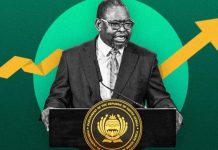Africa-Press – South-Africa. Black Economic Empowerment (BEE) policies cost South Africa around 3% of its GDP every year in compliance costs and lost economic activity.
This translates into an absolute cost of around R226 billion a year, using the latest GDP data from the Reserve Bank.
As a result, BEE is a significant cost to the broader economy, with it being increasingly unclear what South Africans receive in return for this cost.
BEE and its surrounding transformation policies have increasingly become associated with cronyism and corruption, with a handful of well-connected individuals benefitting.
Various studies from Solidarity and the Free Market Foundation, among others, point to the cost of BEE being between 2% and 4% of annual GDP.
The head of the Solidarity Research Institute, Connie Mulder, told BizNews that its study shows the cost to be 3%, with this being a very conservative estimate.
“We did a simple report about what BEE costs the economy and, on a very conservative level, it is about 3% of GDP per year. That is a massive cost we are paying for this policy” Mulder said.
This is not necessarily a problem in itself, with many policies costing South Africa heavily. The issue is that BEE does not come with sufficient benefits to justify this cost, Mulder explained.
“All public policies come with a cost. Usually, they come with a benefit. For example, we pay for an army, it costs taxpayers and the economy, but we are not going to be invaded,” Mulder said.
“We need to drop the emotion and honestly evaluate this policy. It has a massive cost to the economy, what are we getting for it? Are we getting what we want? And the answer, unequivocally, is no.”
Mulder suggested that the primary redistributive policy in South Africa should be changed to a needs-based system to empower people from lower income brackets.
He even said that the country could consider just creating an age-based system, whereby everyone under 35, for example, gets a monthly payment.
“If you remove BEE and its surrounding legislation, you will see much faster economic growth because you are removing burdens of compliance from companies and they can then invest in the economy,” Mulder said.
“If we can get economic growth to 3% or 4%, suddenly most of our problems disappear. The focus should not be on redistributing a shrinking pie. It should be on how we can grow this economy.”
“What we have seen from the ANC for the past 20 years is no real commitment or serious attention paid to growing the economy, much of that has gone to transformation and redistribution.”
BEE under review
BEE has come under increasing pressure in South Africa, with critics ranging from business leaders to ministers in the Cabinet.
However, criticism has come for different reasons, with some calling for the policy to be scrapped and others saying it needs to be enforced more rigorously.
Investec CEO Fani Titi sharply criticised BEE in saying that it has been misapplied, and the opportunities for economic participation it provides have increasingly been linked to political party membership.
“I can understand the frustration that there is,” Titi said. “You’ve had employment-equity legislation for 30 years, yet it hasn’t achieved the desired effect.”
The DA, which is the second-biggest party in the Government of National Unity, has even introduced a Bill to scrap BEE and replace it with means-based redress.
Critics of BEE can also be found within the ANC, but for different reasons. High-ranking officials and government ministers, such as Parks Tau, have called for a review of transformation policies as they have become tainted by cronyism and corruption.
Deputy President Paul Mashatile told the National Assembly on 11 November that there is no need for alternatives to BEE in South Africa.
However, Mashatile said a review and changes to certain parts of legislation could be implemented to address shortcomings.
“To the extent that there may be weaknesses, let’s correct that. Let’s make amendments, that is why there is this review. There is no need to ditch the legislation,” Mashatile said.
This makes a significant change in the government’s approach to criticism of BEE, with previous critiques dismissed out of hand and no reviews put on the table.
Former president Kgalema Motlanthe and Trade Minister Parks Tau both recently criticised the shortcomings of BEE policy at a B-BBEE dialogue.
They argued that the government’s policy of BEE has been tainted by corruption and cronyism, with its continued implementation in the current form being increasingly challenged from all directions.
Tau said this requires an overhaul of the policy to address and ensure it empowers a broader cross-section of South Africa and not just a handful of elites.
Tau’s proposed review and changes seek to remove loopholes that have been exploited by well-connected individuals to ensure they benefit from BEE deals at the expense of ordinary South Africans.
“In fact, we have said in the department that a review of the architecture of the entire transformation programme, policies, and instruments is called for,” Tau said.
The minister particularly singled out the practice of faking BEE compliance by individuals and businesses as one of the main failures of the policy.
This has resulted in the policy failing to bring about genuine inclusion in the economy and uplift millions of South Africans.
“Progress has not been enough to equal the post-1994 promise to free the potential of each citizen, as ownership patterns remain skewed and top management representation for black South Africans remains low,” Tau said.
“Too often, empowerment has been undermined by fronting, tokenism, and financial structures that deny true control.”
For More News And Analysis About South-Africa Follow Africa-Press






